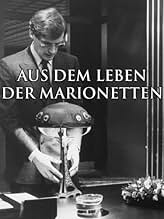AVALIAÇÃO DA IMDb
7,2/10
5 mil
SUA AVALIAÇÃO
Adicionar um enredo no seu idiomaAn account of the events before and after a murder committed by a disturbed businessman in a strained marriage, and what led him to perform such a shocking act.An account of the events before and after a murder committed by a disturbed businessman in a strained marriage, and what led him to perform such a shocking act.An account of the events before and after a murder committed by a disturbed businessman in a strained marriage, and what led him to perform such a shocking act.
- Prêmios
- 1 vitória no total
Paul Bürks
- The Assistant in the fashion show
- (não creditado)
Avaliações em destaque
Perhaps I'm biased as I am a great admirer of Ingmar Bergman, but I found myself both fascinated and impressed by From the Life of the Marionettes. Excepting All These Women, the only film(of those I've seen, which is a little over two-thirds) that I didn't care for, Bergman's films have ranged to solid to outstanding. From the Life of the Marionettes is not one his very finest, but it is one of the films of his that is close to outstanding. Apart from the I agree underdeveloped homosexual subplot, there is very little of the film to criticise. The production values could be seen as stark, but still sublime and even haunting and shot beautifully. Bergman directs superbly with his usual control and discipline, while the speeches are thoughtful and the structure consisting of drama, documentary, character study, flashback and dream sequences is constantly attention-grabbing and I didn't find myself confused by it. The characters could be seen as cold, but purposefully and there is the trademark compelling realism of Bergman's films here. There aren't Sweden's finest ever actors on board, but the acting is still very good. All in all, very undervalued Bergman with lots of interest value. 9/10 Bethany Cox
Pros:
1. The movie begins with an eye-catching opening which is simultaneously tense, suspenseful, and unflinchingly brutal. It also serves as an intriguing view into the main character.
2. The flashbacks are presented with a black-and-white colour palette, which is just a nice and simple way of delineating them from the present.
3. Both Robert Atzorn (Peter Egermann) and Christine Buchegger (Katarina Egermann) deliver fantastic performances.
4. The film serves as a fascinating insight into the mind of a psychopath who also happens to be suffering from marriage and sex issues.
5. The cinematography, especially in regards to the framing of the shots, is sharp and concise.
Cons: 1. The sound design is a little off at times. 2. The continuous sex, and sex-related content, starts to get a little repetitive. 3. The movie, at times, feels too pretentious which pulls the viewer out of the immersion.
Cons: 1. The sound design is a little off at times. 2. The continuous sex, and sex-related content, starts to get a little repetitive. 3. The movie, at times, feels too pretentious which pulls the viewer out of the immersion.
Bergman was on top form writing this piece - there's lots to think about. What motivates a respectable man, whose mental state indicates only a small risk of self-harm, to undertake such a violent and frenzied crime? Do the ulterior motives and actions of those around him (wife, shrink, wife's business partner...)deliberately or unwittingly trigger the crime - or indeed are those sub-plots entirely incidental to the central event? These questions are not answered - they are raised and illuminated.
This is not Bergman's greatest piece of cinema - the mixture of documentary, drama and flashback can be a little disorienting - but the argument of the film drives on relentlessly and it is compulsive watching. Well worth seeing.
This is not Bergman's greatest piece of cinema - the mixture of documentary, drama and flashback can be a little disorienting - but the argument of the film drives on relentlessly and it is compulsive watching. Well worth seeing.
Bergman's working with a very restricted palette here, as he did with The Rite or Winter Light. The romantic, funny touches you expect from him are missing. Peter's mind is crumbling; he's a modern Othello obsessed with his wife's fidelity amid the tasteful furniture of their elegant home. All the action is seen through the distorting lens of Peter's madness. Why would his wife say, in front of strangers, that she has to get drunk to steady her nerves at her mother-in-law's place? This is the disturbed mind at work.
The acting is fine. Robert Atzorn and Walter Schmidinger do very well as, essentially, two sides of the same coin (the stodgy businessman and the gay fashion designer). Christina Buchegger is wonderful as Katharina, the wife; her attempts to win out over Peter's psychosis give the film what drama it has.
The acting is fine. Robert Atzorn and Walter Schmidinger do very well as, essentially, two sides of the same coin (the stodgy businessman and the gay fashion designer). Christina Buchegger is wonderful as Katharina, the wife; her attempts to win out over Peter's psychosis give the film what drama it has.
Ingmar Bergman's From the Life of the Marionettes, his last film done while in exile during the late 70's, hearkens back to his experimental period in the mid to late 60's. Here he's trying for a deconstructive way to get inside the mind of his subjects, most notably the character of Peter Egermann. The fatal flaw of the film, however, is also something that adds an unusual kind of connection to the material for a Bergman film. It's erratic in its narrative as the director tests himself with jumping around from different times around a single event. But unlike how this has been done by the likes of Tarantino, this is meant not really as a useful story trick, but to try to get different perspectives and acute angles of the subject at hand. The film doesn't reach its greatness for the same reason that it does keep itself watchable- this is very murky, depressing times, loaded with dialog that may or may not go ways to help explain or give some interest in the supporting/main characters, and some startling, if dated, surreal experiences.
It's also a little strange that Bergman decided to connect these characters, however loosely, to the couple in the first episode of the Scenes From a Marriage series, where Peter and Katarina (then played by Jan Maljsmo and Bibi Andersson) were the volatile arguers who juxtaposed the main focus of the film. Here, portrayed by Robert Atzorn and Christine Buchegger, are not only not as spot-on as the former actors (though they are still quite good and splendid in some scenes), the couple is picked under Bergman's psychological microscope where the relationship is very strained and a fatalistic. The opening scene is definitely a mind-blower, with an intensity and harsh sexual edge that is uncommon to Bergman's films (one of his best openings to be sure). Indeed, one of the nice twists, a little shocking at first and then intriguing, is how the filmmaker lets out inhibitions and shows the more explicit images of nudity and the sensual, as well as rock and disco music.
Along with a fragmented approach to the storytelling, where infidelities, insecurities, shame, depression, and outright rage and confusion are brought out in segments that range from the convincing to missing the mark. In a way, maybe Bergman's aims are lowered this time in exile, and he delves more into a doomed personality with visual surprise. Sven Nyvkist, as usual, is still very good with what he does in the frame, especially as this is 90% black and white (with a strange blue tint at times), and his services come into great use in a visual detailing of a dream involving Peter and Katarina naked in a wide, white space. It's maybe the best sequence in the film. In experimenting with the dramatic interpretations, it's not as successful, and some of the supporting actors aren't as good as the leads (a scene with one of the actors talking into a mirror is one of my least favorite scenes Bergman's ever wrote/directed).
Its obscurity is not, therefore, that staggering to see. But it is a good and occasionally spine-tingling character study, and if you are into the filmmaker's work already it's a find that might prove better or more fulfilling. 7.5/10
It's also a little strange that Bergman decided to connect these characters, however loosely, to the couple in the first episode of the Scenes From a Marriage series, where Peter and Katarina (then played by Jan Maljsmo and Bibi Andersson) were the volatile arguers who juxtaposed the main focus of the film. Here, portrayed by Robert Atzorn and Christine Buchegger, are not only not as spot-on as the former actors (though they are still quite good and splendid in some scenes), the couple is picked under Bergman's psychological microscope where the relationship is very strained and a fatalistic. The opening scene is definitely a mind-blower, with an intensity and harsh sexual edge that is uncommon to Bergman's films (one of his best openings to be sure). Indeed, one of the nice twists, a little shocking at first and then intriguing, is how the filmmaker lets out inhibitions and shows the more explicit images of nudity and the sensual, as well as rock and disco music.
Along with a fragmented approach to the storytelling, where infidelities, insecurities, shame, depression, and outright rage and confusion are brought out in segments that range from the convincing to missing the mark. In a way, maybe Bergman's aims are lowered this time in exile, and he delves more into a doomed personality with visual surprise. Sven Nyvkist, as usual, is still very good with what he does in the frame, especially as this is 90% black and white (with a strange blue tint at times), and his services come into great use in a visual detailing of a dream involving Peter and Katarina naked in a wide, white space. It's maybe the best sequence in the film. In experimenting with the dramatic interpretations, it's not as successful, and some of the supporting actors aren't as good as the leads (a scene with one of the actors talking into a mirror is one of my least favorite scenes Bergman's ever wrote/directed).
Its obscurity is not, therefore, that staggering to see. But it is a good and occasionally spine-tingling character study, and if you are into the filmmaker's work already it's a find that might prove better or more fulfilling. 7.5/10
Você sabia?
- CuriosidadesDa Vida das Marionetes (1980) is Director Ingmar Bergman's only movie shot in the German language. O Ovo da Serpente (1977) was shot in Germany, too, but mostly in English.
- ConexõesFeatured in Drugoe Kino: From the Life of the Marionettes (2006)
- Trilhas sonorasTouch Me, Take Me
Performed by Rita Wright
Principais escolhas
Faça login para avaliar e ver a lista de recomendações personalizadas
Detalhes
- Data de lançamento
- Países de origem
- Idioma
- Também conhecido como
- From the Life of the Marionettes
- Locações de filme
- Empresas de produção
- Consulte mais créditos da empresa na IMDbPro
Bilheteria
- Faturamento bruto mundial
- US$ 4.293
- Tempo de duração
- 1 h 44 min(104 min)
- Cor
- Mixagem de som
Contribua para esta página
Sugerir uma alteração ou adicionar conteúdo ausente

















